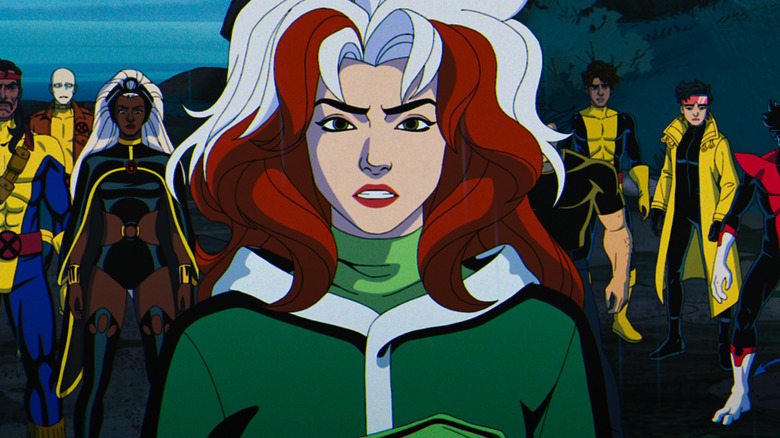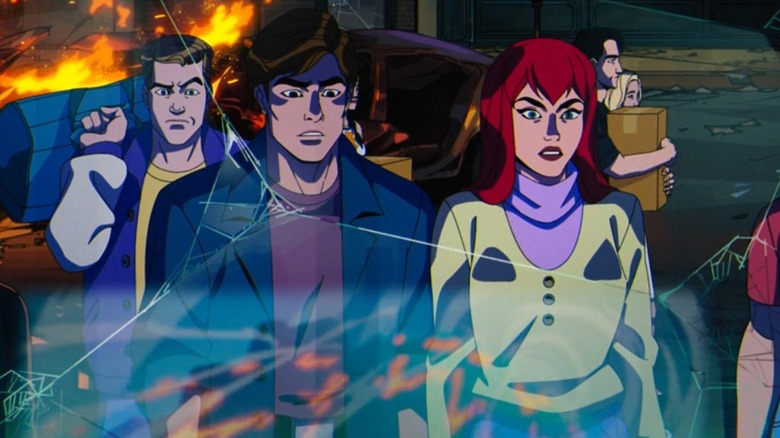X-Men '97 Has Slyly Resolved One Of Marvel Animation's Most Frustrating Cliffhangers
The idea of bringing back a beloved '90s cartoon like "X-Men: The Animated Series" after 30 years sounds quite like a cash grab meant to exploit nostalgic grown-up fans, but it quickly became clear "X-Men '97" was more than the nostalgia-bait the premiere led us to believe.
Indeed, this is a thoughtful follow-up to the already exquisite '90s show, one that takes advantage of the streaming era's embrace of serialization and grittier stories to deliver a bleak yet still hopeful story about loss, grief, and family. The turning point came during the Genosha genocide episode, which made the story and the characters lose their innocence and open their eyes to the reality of their world. This is a season of television that has delivered some poignant character drama and some thrilling superheroics, all while telling a story with big consequences for mutantkind, but also the larger Marvel universe. Make no mistake, this is the best thing to come out of Marvel Studios since "Avengers: Endgame."
Even though this is at times an intimate story, "X-Men '97" also feels very much like part of a larger world full of Marvel heroes, many of whom show up in the finale. The episode not only gives us a fantastic tease for a continuation of the X-Men story, but also provides a surprisingly sweet conclusion to a frustrating cliffhanger from another '90s Marvel cartoon — "Spider-Man: The Animated Series."
In the "X-Men '97" season 1 finale, we see various shots of different Marvel characters reacting to Asteroid M heading toward Earth. Among them are several Avengers, including the return of Captain America, but we also see Daredevil and a friendly neighborhood Spider-Man, accompanied by Mary Jane. This is significant because it finally gives fans of the beloved animated Spider-Man series closure after 26 years.
What happened to Mary Jane in Spider-Man: The Animated Series?
"Spider-Man: The Animated Series" and 1993's "X-Men" share a universe, and they even had a couple of crossovers, meaning this is the same Peter Parker from that show. The "Spider-Man" cartoon was significant because it also took the approach of mostly adapting big storylines from the comics, and it also gave us an early multiversal story involving several Spider-Men, which would eventually take an even bigger leap with various "Spider-Verse" stories.
The original run of "Spider-Man: The Animated Series" had a subplot involving Mary Jane Watson. First, Mary Jane fell into an interdimensional portal at the end of season 3, one created by Green Goblin. She appeared later, but we eventually learn that the Mary Jane we've been following since after season 3 is actually a clone created by Miles Warren, and she eventually dies. In the series finale, we learn the real Mary Jane is still alive somewhere in the multiverse, and Spider-Man sets out with Madame Web to find her.
Unfortunately, "Spider-Man: The Animated Series" was never able to resolve that cliffhanger, because the show was axed due to lack of funding. According to producer John Semper Jr. (via his Facebook), Fox ordered 65 episodes, and that is what was delivered. "New World, who actually produced the show, had gone out of business, so there was nobody to pay for whatever costs Fox wouldn't cover," he said. A pity, since there were ambitious plans that never came to be, including an even bigger "Secret Wars" episode.
But thanks to X-Men '97," we've got some closure for MJ, and perhaps there's a chance that we'll see that classic Spider-Man animated series get a revival too.

